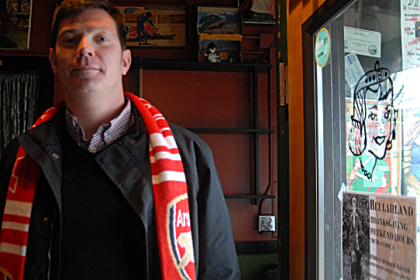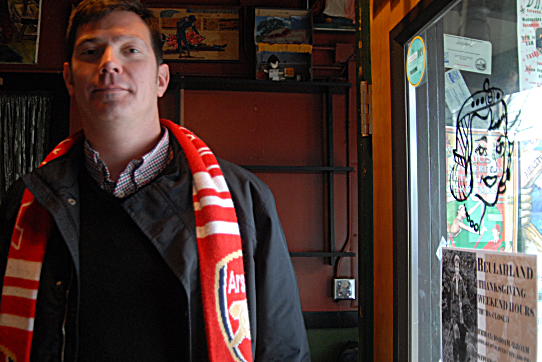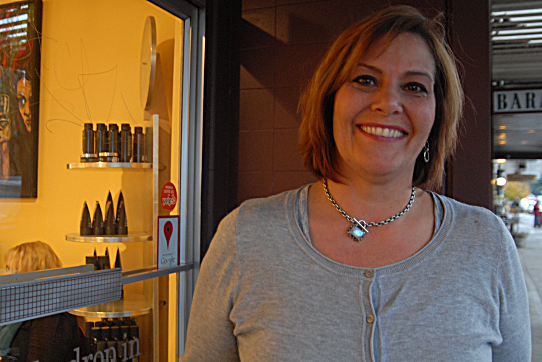
would “adapt” if buffered bike lanes replaced on-street
parking, but that he’d rather keep the parking.
(Photos by M.Andersen/BikePortland)
The question of how to make biking better in the NE 28th Avenue area divides employees from their bosses, businesses from their customers, tenants from their landlords and different kinds of bike users from each other.
If there’s one thing this project doesn’t have, it’s consensus — not among the “bike community” (whatever that is) and not among the “business community” (whatever that is).
We know because we asked.
On Tuesday afternoon, I left my bike and helmet at a parking corral and talked to as many business owners as I could in three hours about the options for how to run the “20s Bikeway” through their area. I introduced myself as reporter — I didn’t say who for; only one owner asked — and did my best to get honest opinions from everyone.
I asked whether they needed auto parking outside their business, and whether it was important for the parking to be free. I explained how the narrow street made it impossible to run standard-width bike lanes without either removing two auto parking lanes or one standard travel lane from 28th, and asked if they thought it would be possible to make 28th bike-friendly without bike lanes, or if traffic should move to a side street like 26th or 30th.
Here’s what I learned:
1) Everyone I talked to knows about the project. Many had heard about it from Jim Kautz, general manager of the neighborhood’s biggest commercial landlord, Bitar Companies, and a vocal foe of parking removal. Others had spoken with Sarah Holliday of Staccato Gelato, who also happened to be one of the owners most firmly opposed to removing all parking. One said he’d seen a city mailing.
2) More than half would rather keep auto parking. For some, parking is more useful for employees than for their customers; in one case, it’s mostly for an unloading zone. Several had simply assumed, upon hearing about the plan, that the city was planning to remove all parking on both sides and seemed to be mentally preparing to deal with that. “If it had to be this street, I would gulp and deal with it,” said Chris Raak of Polliwog, a children’s toy and clothing store who said he feels for environmental reasons that it’s essential to dramatically increase biking in Portland.
3) Most, but not all, think 28th isn’t good for biking. Of the 10 I spoke to, eight were open to giving up some auto parking on 28th to make biking better. Three said their preference was to remove all auto parking and get bike lanes, if that’d make the street better to bike on. “I’d just as soon make it easier for the bicyclists, because I’m always envisioning people getting smeared all over the road,” said Carla Lichter, owner of Zim Zim, a gift shop at SE 28th and Ankeny.
4) Most, but not all, liked the idea of moving the bikeway off 28th. “This street is terrible for biking on,” said Alison Weaver of Meadowlark Preschool.
5) Only one clearly opposed parking meters. “A neighborhood gets busy and you put in meters,” said Jody Mathey of Wooptido hair salon. “It’s not a perfect world, but it makes sense.”
6) Several are frustrated with lax enforcement of time-limited parking on the street. Much of the auto parking on 28th is taken up by people parked for hours or all day, owners said.
7) Many are worried about parking overflow from two nearby apartment projects. More than half the owners mentioned this. “Seven years ago, eight years ago, it would have been fine” to remove parking, said James Lanagen, owner of Beulahland. “With the way that 28th has developed in the last six years, it’s just going to cause more problems with the residential.”
I spoke to nine business owners Tuesday, plus Lichter a few weeks ago by phone. Here’s what they said:
Would less on-street auto parking affect your business? “If it happens, it happens, and people tend to adapt. My business specifically would be among the least affected. I get a lot of pedestrian traffic. I get a lot of bike traffic.”
If the city doesn’t replace parking with bike lanes, should the city try to make 28th safer for people, or try to reroute bike traffic to a side street? The “huge amount of very large trucks” that use 28th will make the street unpleasant to bike on no matter what, “especially on the weekends with families biking.” “The people who bicycle on this street already know the gambles.”
Would less on-street auto parking affect your business? “I think most of our customers walk here anyway. But I do like that I have the parking. … I’ll get over $1,000 of groceries, park out front and get people to help unload. … It’s, like, backbreaking work to go around.”
If the city doesn’t replace parking with bike lanes, should the city try to make 28th safer for people, or try to reroute bike traffic to a side street? When he used to bike more, “personally I actually didn’t like these roads. I’d be on 27th, is where I’d be. … I count it as a good thing that bikers go by, but I don’t think it’s that significant. I think pretty much people know we’re here.”
How would parking meters affect your business? Because so many customers walk, this wouldn’t be a big commercial burden, but “I have staff who work eight-hour shifts. … I once as a cook didn’t take a job because there were parking meters. There was nothing I could do.”
Would less on-street auto parking affect your business? “Just about everybody who has a business” would agree that a reasonable solution for the street “for sure is not removing parking” all along the street. “There is no street in Portland that has removed on-street parking in both directions for a bike lane. So it would be an extreme example. …. Losing a few parking spots is not a big deal.”
If the city doesn’t replace parking with bike lanes, should the city try to make 28th safer for people, or try to reroute bike traffic to a side street? She’s strongly in favor of moving most bike traffic off the street, though she thinks some will still use it. “I’m a longtime bike commuter in this area. I’m very glad they’re doing something. … A skinny bike lane can be worse than no bike lane. … It’s not the speed of the traffic. It’s the people pulling in and out. … It’s a combination of parked cars and people just not paying attention.”
Would less on-street auto parking affect your business? “Losing a lot of parking spaces on this street would be pretty hard for us. Our business is already kind of from the previous century.” But he thinks removing parking might be a good idea anyway. “The first thing we have to do is make it OK and safe and happy for people to ride your bike around. … That has to happen, or we’re all going to hell in a handbasket because of the weather changing. … If it had to be this street, I would gulp and deal with it.”
If the city doesn’t replace parking with bike lanes, should the city try to make 28th safer for people, or try to reroute bike traffic to a side street? “The whole stretch of it from Belmont or Stark — it’s not a good place to ride bikes,” but there are “not many options” for other routes because of the lack of traffic signals. He doesn’t think “traffic calming” works and prefers enforcement. “Speed limits — just enforce ’em. If it is a bike street, especially enforce them. … I don’t think people are going to adjust their behavior until there’s some policing.” He said adding a traffic signal to make the area better for bikes would be good: “If the future costs $100,000, fine.”
How would parking meters affect your business? “I think it’d be good. … There’s 30-minute, 1-hour spots that never get enforced.”
Mathey was the only owner who asked me before the interview who I worked for; I told her, but said I was interested in her honest opinion.
Would less on-street auto parking affect your business? “If they would have asked me this two years ago before those big apartments came up, I wouldn’t have cared. … 28th is too busy. If you take the parking away, it’s going to be a nightmare.”
If the city doesn’t replace parking with bike lanes, should the city try to make 28th safer for people, or try to reroute bike traffic to a side street? “Push it over. … Bicycles always win in Portland. They always get their way.”
How would parking meters affect your business? “I think that’s a good idea, actually. A neighborhood gets busy and you put in meters. It’s not a perfect world, but it makes sense.”
Would less on-street auto parking affect your business? Weaver’s main concern isn’t so much parking as it is parents being able to drop their children off at her front curb. “I don’t know. It’s sometimes hard for parents to get right in front. Parking is already bad enough in this neighborhood. … I would love to be on a street where it’s all bikes, but parking’s always going to be a need.”
If the city doesn’t replace parking with bike lanes, should the city try to make 28th safer for people, or try to reroute bike traffic to a side street? “I don’t own a car, so I’m a big bike commuter person. … This street is terrible for biking on. It’s terrible. I got doored.” She likes the idea of sending bikes to side streets, but worries that people might not do it if the route zigzags too much.
What effect would less auto parking have on your business? “I’ll tell you right now, our members don’t like it. But me personally, because I sit at this desk all day and see the street, I’m for it.” Edgeston, whose visitors use both on street parking and a small on-site parking lot when they arrive by car, said he regularly sees crashes and near-misses as cars and trucks try (and fail) to make it between the stoplights at Glisan and Sandy. He said replacing parking with bike lanes would increase safety. “I think it’s a great idea.”
If the city doesn’t replace parking with bike lanes, should the city try to make 28th safer for people, or try to reroute bike traffic to a side street? “It’s unsafe the way it is right now,” Edgeston said. But he’s dubious that people on bikes would actually turn off the street, even if the official route went elsewhere.
What effect would less auto parking have on your business? “Honestly, I’m a cyclist. I totally understand the need for a north-south cycling route. But I feel pretty comfortable cycling on 28th, because the cars can’t go that fast anyway. … We need our parking here too.”
If the city doesn’t replace parking with bike lanes, should the city try to make 28th safer for people, or try to reroute bike traffic to a side street? Angot leaned toward improving 28th and worried that bikes couldn’t actually be lured away from it. She was intrigued by the idea of one-way auto traffic on 28th, with bike lanes and auto parking on both sides.
How would parking meters affect your business? “My first reaction is that it’d be bad. I wish we had an employee parking lot.”
—
These business owners don’t speak for residents of the neighborhood, of course, or for freight customers like the Coca-Cola bottling plant across the street from several of them. And they certainly don’t speak for the many thousands of people who live elsewhere in the region and use 28th Avenue. Nor do they speak for their own employees.
“It is a bike route,” said Mark Simmons, a Beulahland employee. “Cars can — how you say — go to 33rd.”
Simmons’s job title, he said: dishwasher.
— Learn more about the 20s Bikeway Project in our archives.









